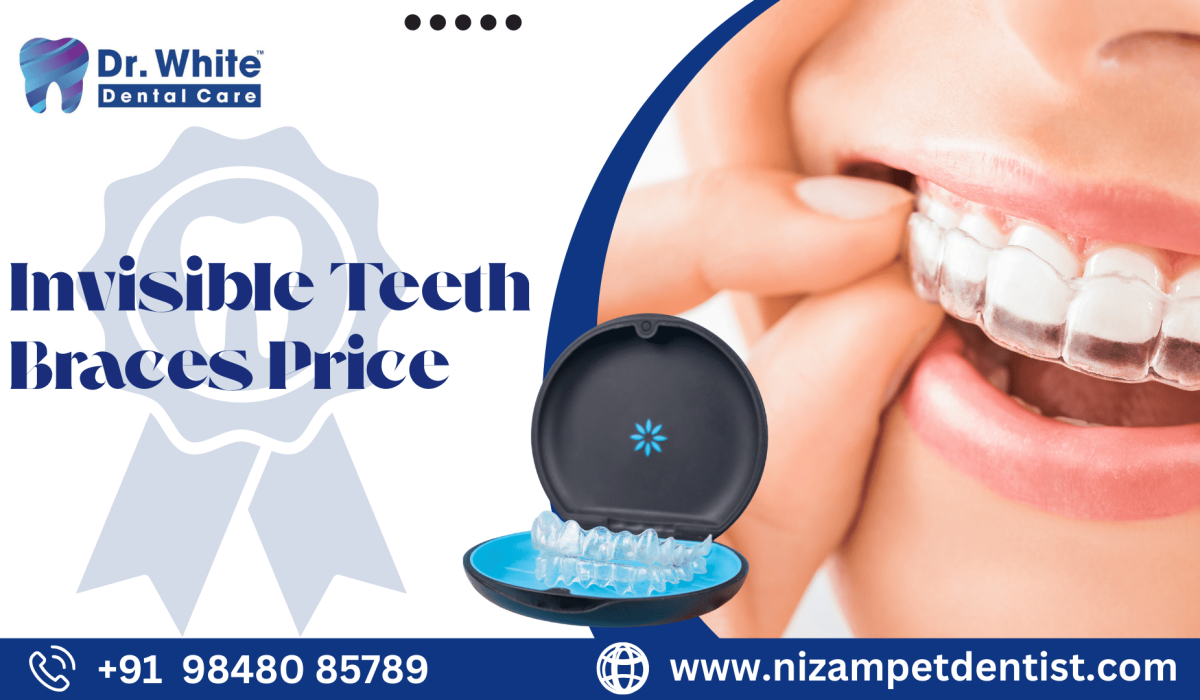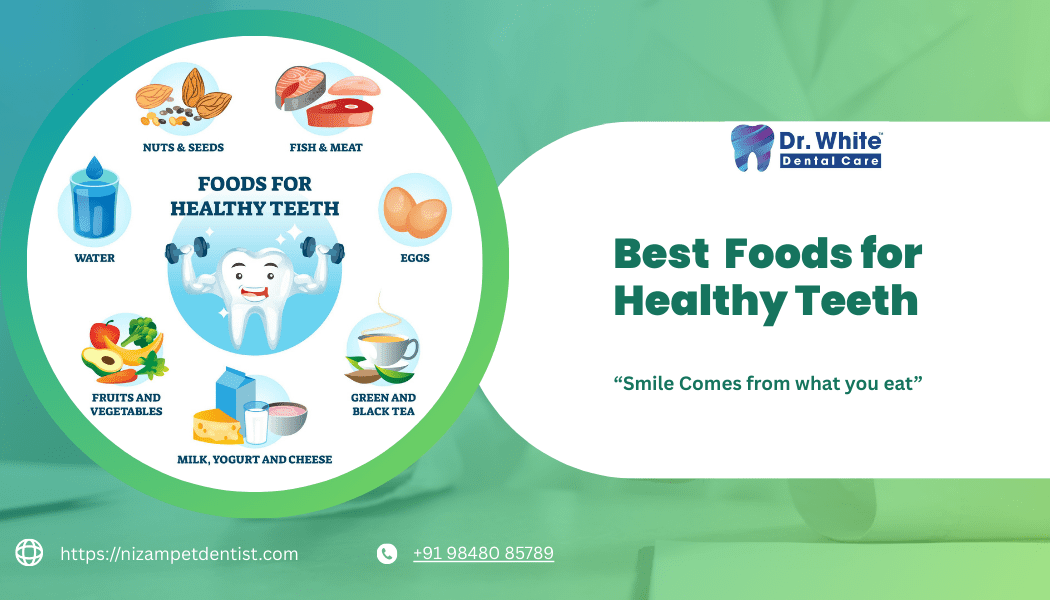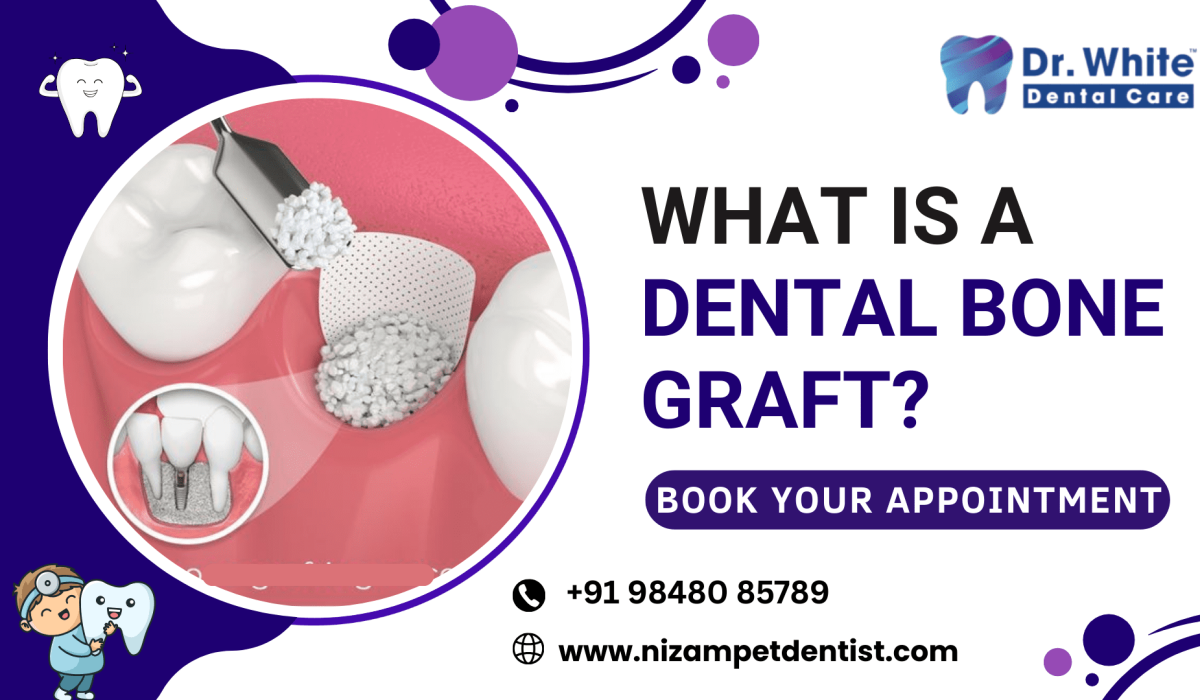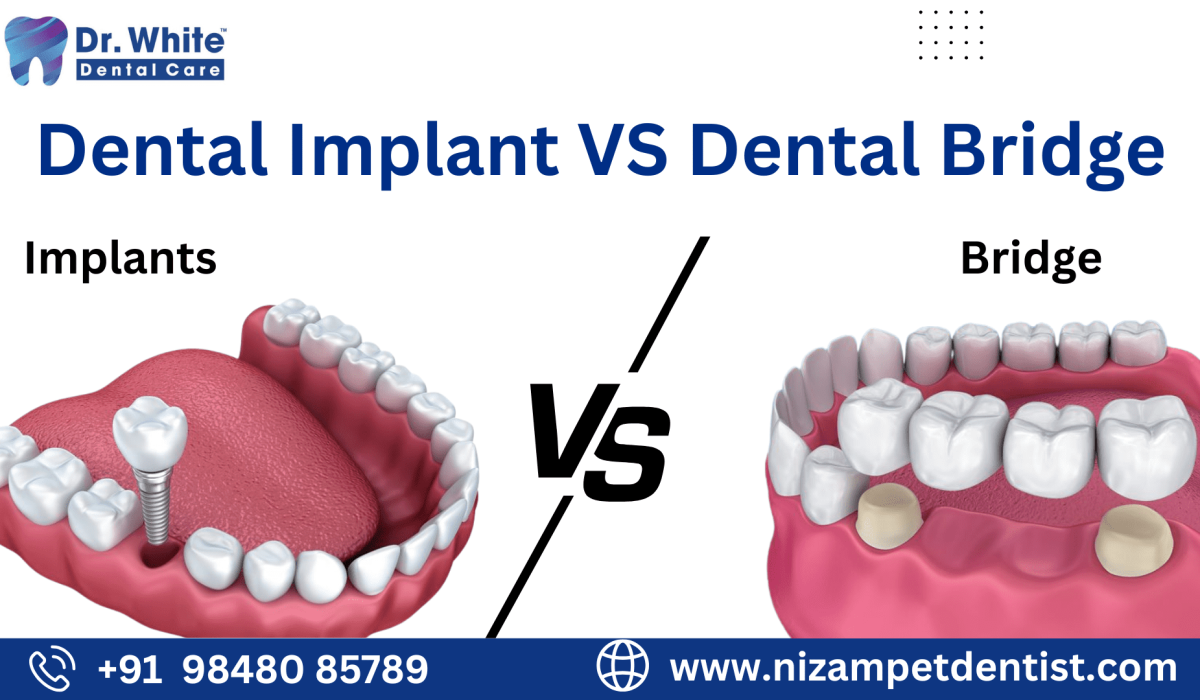Dental Implants vs Bridges vs Dentures
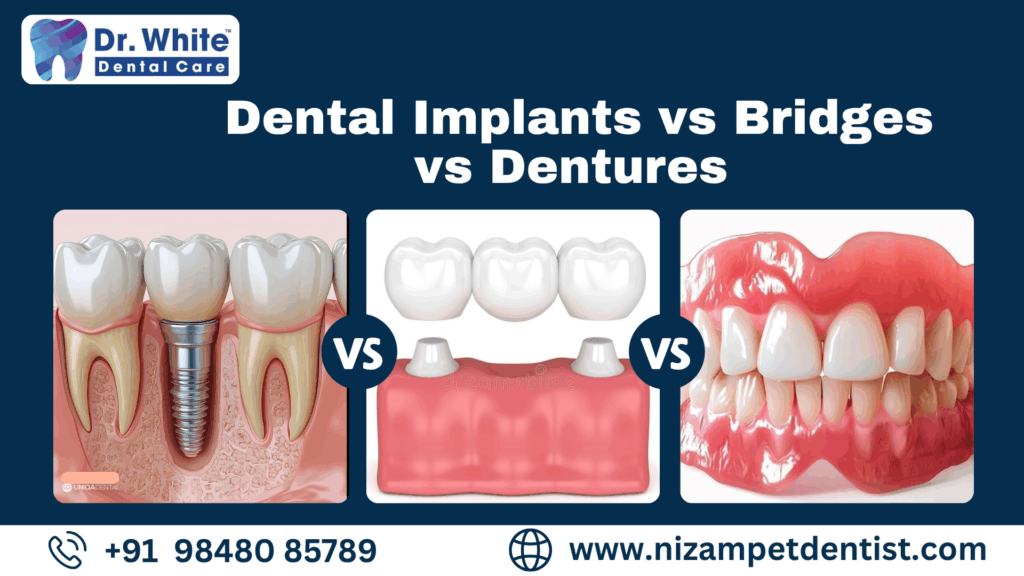
When it comes to replacing missing teeth, patients often feel overwhelmed by the choices available. Should you go with dental implants, bridges, or dentures? Each solution has its own benefits and limitations, and understanding these can help you make an informed decision for your oral health.
At our clinic – whether you’re searching for the best dental clinic in Madinaguda or the best dental clinic in Nizampet – we ensure you receive personalized guidance based on your specific needs.
What Happens When You Lose a Tooth?
Losing a tooth isn’t just a cosmetic problem—it can significantly impact your overall dental health and daily life. With over 15 years of experience in dental care, I’ve seen how untreated tooth loss can lead to various oral health complications.
Here’s what happens when a tooth is missing:
1. Difficulty Chewing Food
- Even a single missing tooth can make eating difficult.
- You may start chewing on one side, causing uneven tooth wear.
- This can contribute to jaw discomfort and digestive issues due to improper chewing.
2. Shifting of Nearby Teeth
3. Jawbone Loss Over Time
- The jawbone needs stimulation from tooth roots during chewing to stay strong.
- Without a tooth, the bone may begin to shrink over time (bone resorption).
- This can lead to a sunken facial appearance and may contribute to further tooth loss if untreated.
4. Speech Problems
- Missing front teeth especially affect pronunciation.
- You may develop a lisp or find it hard to speak clearly and confidently.
5. Reduced Self-Confidence
- Gaps in your smile can make you feel embarrassed or self-conscious.
- Many people hesitate to smile, laugh, or speak in public, impacting their social and emotional well-being.
Dental Implants
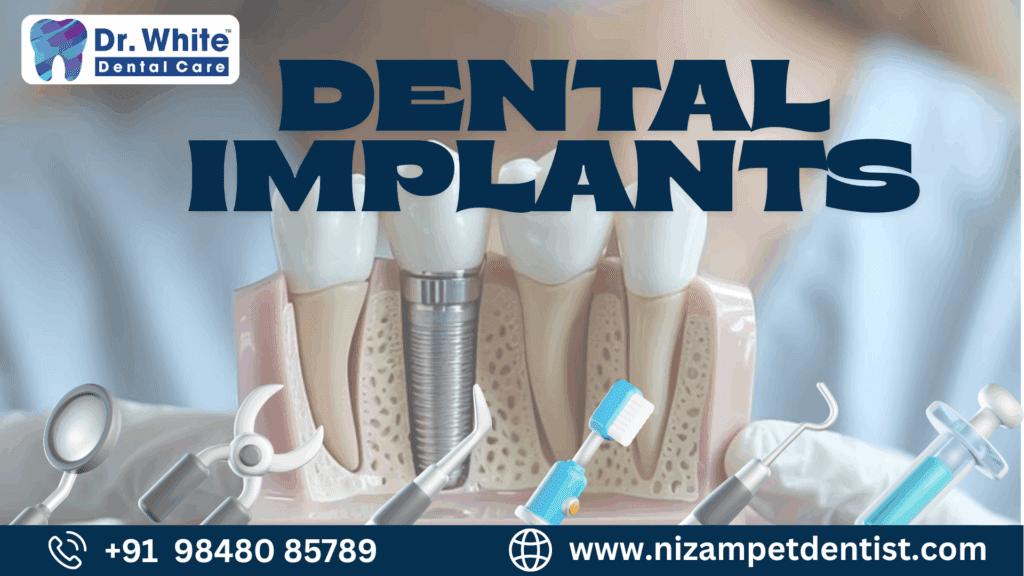
What Are Dental Implants?
Dental implants are one of the most advanced and widely used ways to replace missing teeth. They act like artificial tooth roots and are usually made from titanium — a strong, biocompatible material that your body accepts naturally. These implants are surgically placed into your jawbone, where they fuse with the bone over time, creating a strong foundation for crowns, bridges, or even full dentures.
As a dental professional with over 15 years of experience, I’ve seen how life-changing implants can be for patients. They restore more than just your smile—they help restore confidence, chewing ability, and overall oral health.
Key Benefits of Dental Implants
- Look and Feel Like Real Teeth Implants closely resemble natural teeth in appearance, feel, and function. Most people can’t tell the difference.
- Long-Lasting and Durable With good care, implants can last 20 years or more and may last a lifetime in some cases. They’re made to withstand daily use just like your natural teeth.
- Prevents Bone Loss in the Jaw Unlike bridges or dentures, implants stimulate your jawbone and prevent the bone from shrinking, helping to preserve your facial shape.
- Protects Nearby Teeth Dental implants don’t require cutting or altering the surrounding teeth, unlike traditional bridges. This helps maintain the health of your natural teeth.
- Easy to Maintain You can brush and floss dental implants much like natural teeth, though your dentist may recommend specific cleaning aids.
Who is a Good Candidate for Dental Implants?
Dental implants are a great choice for many people, but a few factors determine eligibility:
- You have enough healthy jawbone to support the implant.
- Your gums are free from active infection like gum disease.
- You’re in good general health, and preferably a non-smoker, as smoking can affect healing and implant success.
- You’re committed to oral hygiene and regular dental visits.
- If you’re not sure whether implants are right for you, we offer thorough evaluations, including 3D scans, to determine suitability.
Things to Consider (Possible Limitations)
- Cost Implants have a higher upfront cost than other options, but they are an investment in your long-term dental health. They also reduce the need for future repairs or replacements.
- Surgical Procedure Required since the implant must be placed into the bone, minor surgery is involved. Healing time can vary from a few weeks to a few months, depending on the individual case.
- Not Suitable for Everyone Patients with very low bone density, uncontrolled diabetes, or certain medical conditions may need special care or alternatives like bone grafting before an implant can be placed.
Dental Bridges
What Are Dental Bridges?
Dental bridges are a common and effective way to replace one or more missing teeth. As the name suggests, a bridge literally “bridges” the gap left by missing teeth. It works by placing crowns on the natural teeth on either side of the gap (called abutment teeth), which then hold a false tooth (called a pontic) in place between them.
With over 15 years of experience treating patients, I can say that bridges are a great solution for those who need a faster, fixed replacement without surgery.
Key Benefits of Dental Bridges
- Quick and Simple Process: The entire procedure usually takes about 1–2 weeks, making it a faster option than implants.
- More Budget-Friendly: Bridges typically cost less than dental implants, making them a more accessible option for many patients.
- Permanently Fixed: Unlike removable dentures, bridges are cemented in place, so you don’t have to remove them daily or worry about them shifting while speaking or eating.
- Restores Function and Appearance: You can chew, speak, and smile with confidence again — bridges restore both functionality and aesthetics.
Things to Consider (Possible Drawbacks)
Dental bridges are suitable for patients who:
- Have one or two missing teeth in a row.
- Have strong, healthy teeth on either side of the missing tooth to support the bridge.
- Want a non-surgical solution for tooth replacement or are looking for a quicker, cost-effective alternative to implants.
- We always do a thorough examination to make sure your remaining teeth can support a bridge successfully.
Who Is a Good Candidate for a Dental Bridge?
- Healthy Teeth Need to Be Trimmed: To place the bridge, the adjacent teeth must be filed down to fit crowns. This may not be ideal if those teeth are otherwise healthy and untouched.
- Doesn’t Prevent Bone Loss: Unlike dental implants, bridges do not stimulate the jawbone, which means the bone underneath the missing tooth can shrink over time.
- May Need Replacement: In 7–10 Years Although durable, bridges may wear out or loosen over time and typically need to be replaced every 7–10 years with proper care.
Dentures
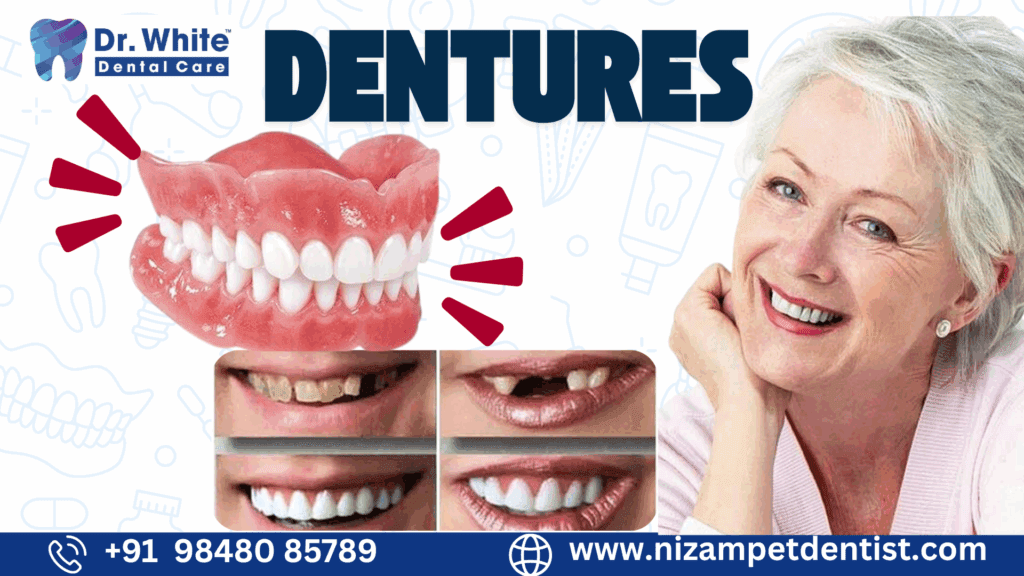
What Are Dentures?
Dentures are removable dental appliances designed to replace several missing teeth. They are a time-tested and affordable option for restoring your smile and improving your ability to eat and speak.
There are two main types:
- Partial Dentures: Replace a few missing teeth while keeping your remaining natural teeth.
- Full Dentures: Replace all teeth in the upper or lower jaw, often used when no natural teeth remain.
Benefits of Dentures
- Cost-Effective Solution: Dentures are more affordable compared to implants or bridges, making them accessible for most patients.
- No Surgery Needed: This is a non-invasive option that doesn’t require surgery, which is ideal for patients who may not be fit for surgical procedures.
- Custom Fit for Comfort: Modern dentures are carefully crafted to fit your mouth, ensuring better comfort, function, and appearance.
- Restore Appearance & Function: Dentures help restore facial structure, improve chewing and speech, and boost self-esteem.
Who Is a Good Candidate for Dentures?
Dentures are a suitable choice for:
- People who have lost several or all teeth in a jaw.
- Patients with weakened jawbones, where implants aren’t a safe or practical option.
- Individuals looking for a more economical tooth replacement solution.
- Those who prefer a non-surgical treatment path.
- We always assess your oral condition to recommend whether partial or full dentures will work best for your situation.
Things to Consider (Possible Drawbacks)
- May Shift or Slip
Especially during eating or talking, dentures can move slightly, which may require some adjustment time. - Requires Daily Cleaning
Dentures need to be removed and cleaned daily to maintain hygiene and prevent oral infections. - Less Natural Feel Compared to implants or bridges, some patients feel that dentures may not feel as natural initially, though most adapt well over time.
Implants vs Bridges vs Dentures
Feature | Dental Implants | Dental Bridges | Dentures |
Lifespan | 15+ years (may last longer with proper care) | 7-10 years | 5-7 years |
Looks & Feel | Most natural | Natural | Less natural |
Bone Preservation | Yes | No | No |
Invasiveness | Surgical | Minimal | Non-invasive |
Cost | High | Moderate | Low |
Maintenance | Like natural teeth | Regular brushing/flossing | Daily removal & cleaning |
Why Choose an Implantologist in Nizampet – Dr. Sri Lakshmi’s Guide
1. Expertise in Advanced Dental Implants
- A trained implantologist knows how to handle complex cases safely and successfully.
- We use advanced techniques to ensure the implant fits perfectly into your bone and functions like a natural tooth.
2. Personalized Treatment Planning
- Every mouth is different. A specialist will thoroughly assess your jawbone, gums, and oral health before recommending treatment.
- Using 3D scans and digital planning, we make sure the implants are placed with precision.
3. Better Long-Term Results
- When done by an expert, dental implants can last 10–20 years or longer with proper care.
- Choosing a qualified implantologist helps improve the chances of success and long-term comfort.
4. Preserves Jawbone and Facial Structure
- Missing teeth lead to bone loss. Implants stop this by stimulating the jawbone, just like natural teeth.
- This helps maintain your face shape and prevents premature aging.
5. Safe, Sterile Environment
- At our clinic in Madinaguda, we follow strict sterilization and safety protocols.
- All implant surgeries are performed in a hygienic, stress-free setting for your comfort and safety.
6. Faster Recovery with Modern Technology
- We use minimally invasive techniques, which can lead to quicker healing and less discomfort.
- Many patients can return to daily activities within a few days.
7. Caring, Supportive Follow-Up
- Dental implants are a journey — not just a one-time procedure.
- We provide ongoing support, follow-up care, and education to help you maintain your implant for life.
What to Expect from Dental Implants in Nizampet?
By Dr. Sri Lakshmi – 15+ Years of Experience in Implant Dentistry
1. Initial Consultation & Evaluation
- Your journey starts with a detailed dental check-up.
- We take X-rays or 3D scans to check bone strength and gum health.
- Based on the results, we’ll create a custom treatment plan just for you.
2. Planning the Implant Placement
- If your jawbone is healthy, we can schedule the implant surgery.
- If there’s bone loss, you may need a bone graft before the implant.
- Everything is explained in simple terms so you can make the right choice.
3. The Implant Surgery
- The procedure is done under local anesthesia and is usually painless.
- A small titanium post is placed into your jawbone, acting like a tooth root.
- The surgery is quick and done in a sterile, stress-free environment at our clinic in Madinaguda.
4. Healing and Osseointegration
- After the implant is placed, your body begins to bond with the implant.
- This process, called osseointegration, takes 3–6 months.
- You’ll be given tips and medications to heal comfortably at home.
5. Attaching the Crown
- Once healing is complete, we fix a custom-made crown on the implant.
- The crown is crafted to closely match the appearance, comfort, and function of a natural tooth.
- You can now eat, smile, and speak with full confidence again.
Which One is Right for You?
Choosing between dental implants, bridges, and dentures isn’t a one-size-fits-all decision. Each option has its own advantages and is suited to different needs and lifestyles. As a dental professional with over 15 years of experience, I always emphasize the importance of personalized care when it comes to tooth replacement.
Here are some key factors we consider during your consultation:
1. Your Oral Health
The condition of your gums, remaining teeth, and jawbone health plays a big role in determining the best treatment.
- In case of dental implants, healthy gums and adequate bone are essential.
- Bridges need strong adjacent teeth for support.
Dentures are ideal when there are multiple missing teeth or bone loss.
2. Number of Missing Teeth
- If you’re missing a single tooth, a dental implant or bridge might be best.
- If you’ve lost several or all teeth, partial or full dentures may be more suitable.
- We tailor our treatment plans based on how many teeth you’re missing and where.
3. Bone Quality
- The jawbone needs enough strength and density to support a dental implant properly.
- If there’s bone loss, additional procedures like bone grafting may be required before implant placement.
- In such cases, bridges or dentures might be considered instead, especially if surgery isn’t preferred.
4. Budget
We recognize that pricing is a key factor for many patients.
- Implants have a higher upfront cost but last longer and prevent bone loss.
- Bridges are moderately priced and quicker to complete.
- Dentures are generally the most affordable solution, especially for full arch replacement.
5. Personal Preferences
- Do you prefer a fixed, permanent solution? Implants or bridges may suit you.
- Looking for a removable and cost-effective option? Dentures could be ideal.
- Some patients prefer non-surgical treatments, while others want the most long-term, natural-feeling outcome.
Expert Care at the Best Dental Clinic in Nizampet
At our dental clinic in Nizampet, we believe that restoring a smile means more than just fixing teeth — it’s about helping you feel confident, healthy, and comfortable every day. With over 15 years of experience treating patients of all ages, we understand that every smile is unique and deserves personalized attention.
Whether you’re missing one tooth or need a full-mouth replacement, we’re here to provide gentle, expert guidance at every step of your journey.
Here’s What You Can Expect From Our Team:
- Detailed Consultation and Personalized Planning
- We take time to listen to your concerns, explain your options clearly, and design a treatment plan that suits your needs, lifestyle, and budget.
Advanced Diagnostic Technology
- Using modern tools like digital X-rays, 3D scans, and intraoral imaging, we make sure every procedure is accurate, safe, and comfortable from start to finish.
High-Quality, Long-Lasting Materials
- We use trusted materials that are durable, natural-looking, and biocompatible, ensuring your restorations look great and feel just like real teeth.
Friendly, Patient-Centered Care
- From the moment you walk into our clinic, you’ll feel at ease. Our caring staff and doctors are committed to making your dental experience stress-free and positive.
Conclusion
Choosing the right way to replace missing teeth — whether it’s dental implants, bridges, or dentures — is an important decision that affects your smile, comfort, and overall health. The good news is that you don’t have to make this decision on your own.
With over 15 years of experience in dental care, we’ve helped many patients understand their treatment options and regain confidence. We know that every patient is different — and that’s why we take the time to listen, explain, and recommend what’s truly best for you.
We are here
Enquire Now
FAQ
- Implants last longer and feel more like natural teeth.
- Bridges are quicker and cost less but may need replacement in 7–10 years.
- Implants don’t affect nearby teeth, but bridges require support from healthy teeth.
- Bridges are fixed in place, while dentures are removable.
- Dentures are better if you’re missing many teeth or want a budget option.
- Bridges feel more natural and are easier to get used to for smaller gaps.
- Implants are more stable, natural-looking, and long-lasting.
- Dentures are more affordable and suitable for people with weak jawbones.
- Implants help keep the jawbone strong, while dentures do not.
- Dentures can become loose and affect speech or chewing.
- Long-term use may lead to jawbone shrinkage.
- Implants or bridges often give better comfort and stability.
- It’s best to remove dentures at night to rest your gums.
- Sleeping without them keeps your mouth healthier.
- Leaving them in overnight may cause irritation or infections.
- Yes, but it may be harder than with natural teeth or implants.
- Cut steak into small, soft pieces for easier chewing.
- Use both sides of your mouth while chewing to keep dentures stable.
- You can leave them in water overnight or when not wearing them.
- Water keeps dentures from drying out or warping.
- Always use clean, room-temperature water – not hot water.
- Clean dentures at least twice a day – morning and night.
- Rinse them after meals to remove food and prevent stains.
- Use a soft brush and mild denture cleanser, not regular toothpaste.
- Rinsing after every meal helps remove food particles.
- You don’t need a full cleaning every time, just a rinse is okay.
- Deep clean them twice a day for best hygiene.
- Well-fitting dentures usually stay in place without glue.
- Adhesive can help if your dentures feel loose or you’re new to wearing them.
- If they keep slipping, visit your dentist for adjustments.

